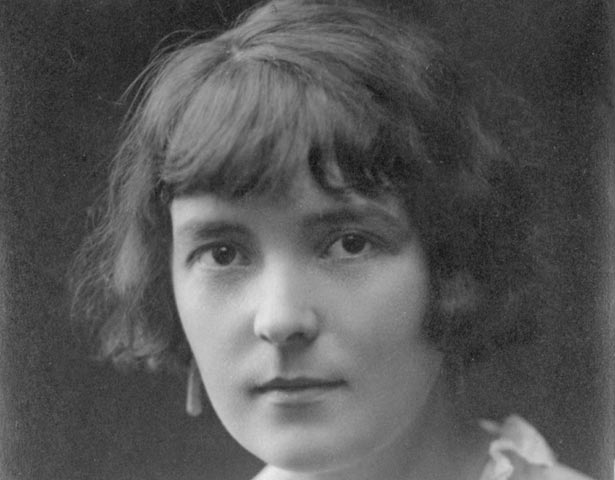
The opening of Katherine Mansfield's wonderful story, The Doll's House, is worthy of analysis. Here it is:
When dear old Mrs. Hay went back to town after staying with the Burnells she sent the children a doll's house. It was so big that the carter and Pat carried it into the courtyard, and there it stayed, propped up on two wooden boxes beside the feed-room door. No harm could come of it; it was summer. And perhaps the smell of paint would have gone off by the time it had to be taken in. For, really, the smell of paint coming from that doll's house ("Sweet of old Mrs. Hay, of course; most sweet and generous!") -- but the smell of paint was quite enough to make any one seriously ill, in Aunt Beryl's opinion. Even before the sacking was taken off. And when it was . . .
There stood the doll's house, a dark, oily, spinach green, picked out with bright yellow. Its two solid little chimneys, glued on to the roof, were painted red and white, and the door, gleaming with yellow varnish, was like a little slab of toffee. Four windows, real windows, were divided into panes by a broad streak of green. There was actually a tiny porch, too, painted yellow, with big lumps of congealed paint hanging along the edge.
But perfect, perfect little house! Who could possibly mind the smell? It was part of the joy, part of the newness.
"Open it quickly, some one!"
The hook at the side was stuck fast. Pat pried it open with his pen- knife, and the whole house-front swung back, and -- there you were, gazing at one and the same moment into the drawing-room and dining-room, the kitchen and two bedrooms. That is the way for a house to open! Why don't all houses open like that? How much more exciting than peering through the slit of a door into a mean little hall with a hat-stand and two umbrellas! That is -- isn't it? -- what you long to know about a house when you put your hand on the knocker. Perhaps it is the way God opens houses at dead of night when He is taking a quiet turn with an angel. . . .
The point of view in the opening paragraph is interesting: it is omnisicent third person – an external narrator telling us the story. But it is also closely told from the point of view of Aunt Beryl. “Dear old Mrs Hay” and “Sweet of old Mrs Hay” could almost be her speaking. This is an example of the Uncle Charles Principle, where the voice becomes so linked to a specific character it begins to take on characteristics of that person. The fact that the opening is so closely linked to Aunt Beryl alerts the reader to the fact that she will be a key person in the story.
But then there is an ellipsis (…) which clearly separates this paragraph from the next one. And now the second and third paragraphs are more closely linked to the children. The doll’s house is described in loving detail. “Perfect little house! Who could possibly mind the smell?” This is a totally different POV from the first paragraph. Compare the constant references to paint (and even glue and varnish) with the staid distaste for the smell in that opening paragraph. Could a greater distinction be made between these opposing viewpoints?
And then in paragraph five we have “there you are”, which has the effect of drawing the reader into the story. But which point of view are we drawn into? Aunt Beryl’s or the children’s? It is the children’s, of course, and in this way the reader becomes complicit in their excitement.
In the space of very few words, Mansfield has brilliantly established the tension in the story – the doll's house – and the source of conflict – Aunt Beryl. This opening is rich in description. There is strong characterisation of both Aunt Beryl and the – as yet unnamed but clearly excited – children. But there is clearly a distinction between the reactions of Aunt Beryl and the children, and it is clear that this is where the tension will develop in the story. It is also clear, from that fifth paragraph, where the reader's sympathies are expected to lie.
The economy is exemplary. A brilliant piece of writing.
Remarkably, Katherine Mansfield was dissatisfied with her short stories. She said: "I've been a selective camera, and . . . my slices of life have been partial, misleading, and a little malicious. Further, they have had no other purpose than to record my attitude which in itself stood in need of change if it was to become active instead of passive." I think she is being unnecessarily hard on herself here. While many of her stories end in great unhappiness, there is nothing malicious in them. On the contrary, the stories are designed to allow us, the impartial readers and observers of these people’s misfortunes, to assess what might be done to remedy those misfortunes. They are, then, entirely hopeful and honest endeavours.
Shortly before her death (at the very early of 34, from tuberculosis), she wrote witheringly of her friends in London who:
have come to an agreement not to grow any more, to stay just so – all clipped and pruned and tight. As for taking risks, making mistakes, changing their opinions, being in the wrong, committing themselves, losing themselves, being human beings in fact –no, a thousand times!
And this, it seems to me, is the key to her work. There is a serious and earnest searching for something in these stories, some understanding of what it is to be human, to be alive, to be in love.
